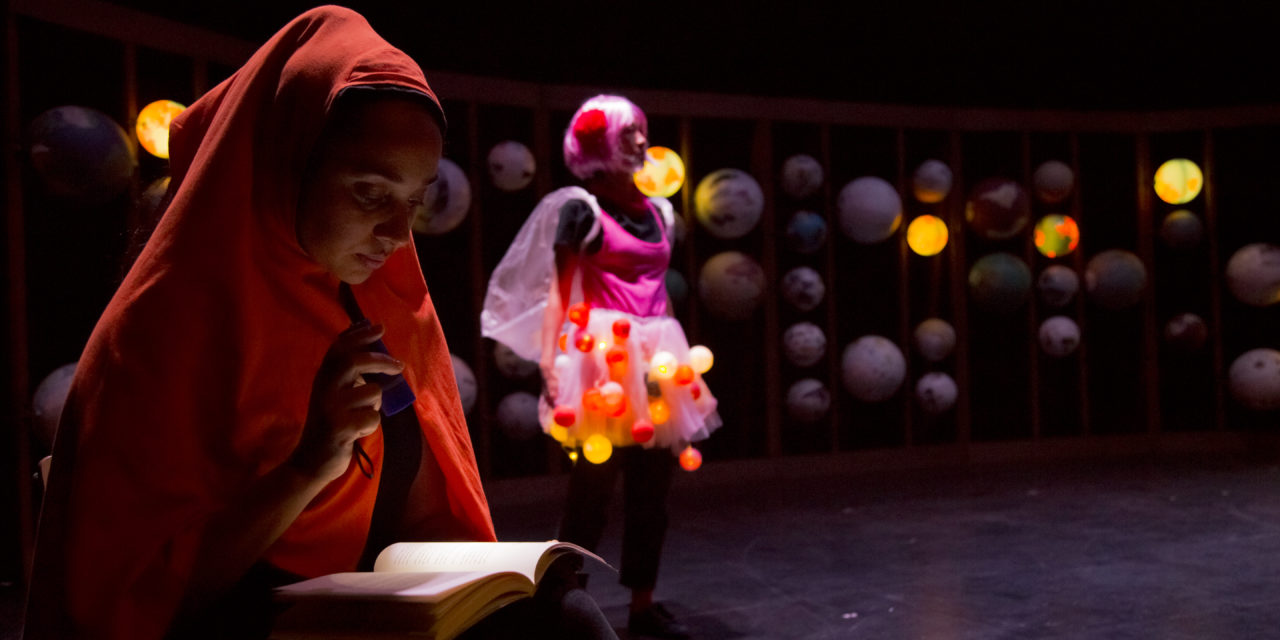In October 2018, Theatre Times translation editor William Gregory became the inaugural translator in residence at Spain’s Arniches Theatre in a pioneering program to promote the translation of plays in a theatre setting. In this personal reflection on the residency, he discusses his experience, reflects on its impact on his work, and argues for such schemes to be taken up in other countries, not least his own.
Translation can sometimes be a lonely profession. It is ironic that, although we work with texts that come from all over the world, many of us do much of our work in our own homes, sometimes not even meeting the writers we work with or the people who commission us face-to-face. It can also be a precarious profession. Just like freelancers of all professions, our income fluctuates and we rely on generating a flow of work in order to make our choice of career feasible. One of the counterweights to these challenges over recent years has been the translation residency.
In a number of locations around the world, organizations both private and public have established spaces and programs where literary translators can carry out their work in the company of other artists, with some financial support, and without the usual distractions of home. They range from a simple offer of free accommodation in a tranquil location, to fully-funded opportunities to work on something new. Spain has the Casa del Traductor in Tarazona; Switzerland has the Übersetzerhaus Looren; Canada has the Banff International Literary Translation Centre.
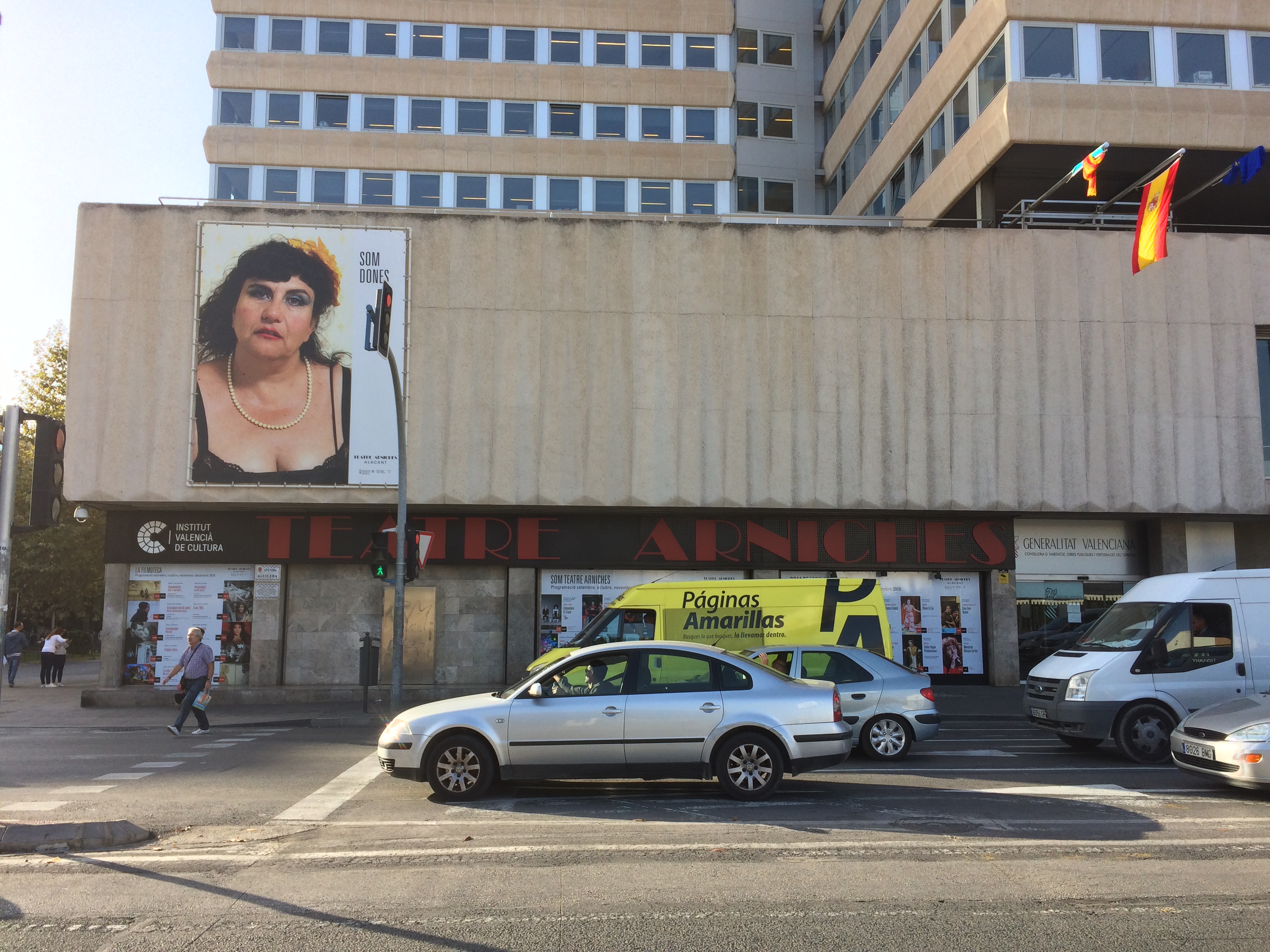
The Teatre Arniches, host venue of the GVA/IVC theatre translation residency
Some of these residencies are open to translators of drama, although they are often steered more towards publication and sometimes require a contract with a publisher in order for the translator to be eligible. For theatre translators, especially working into English, this can be challenging: if we have a contract, it is more likely to be with a theatre or a playwright than with a publisher, owing to the usual process of Anglophone theatre publishers of only going to print after a play has been professionally staged (this is the opposite process of, for example, the practice in Spain).
Other kinds of residencies that have emerged recently, residencies for a single translator over a period of time within an institution. The British Library has a translator in residence who spends a whole year at the library engaging in a variety of projects; the University of Iowa hosts two resident translators per year in its literary translation department. These are open to theatre translators just as they are to translators of other genres, but are not theatre specific.
In 2018, however, a new residency emerged which was unique: a translation residency in a theatre, aimed specifically and exclusively at translators of plays.
With a view to internationalizing the work of local playwrights, the Institut Valencià de Cultura (the culture institute of the government of Spain’s Valencia region) launched its inaugural theatre translation residency. No contract with a publisher was required; only a project involving the translation of a 21st-Century play written by a Valencian or Valencia-based writer in either the Spanish or Valencian language. The selected translator would spend three weeks embedded in the Teatre Arniches, Alicante, and would receive a stipend to cover travel, accommodation, and living costs as well as an overall fee to pay for their work.
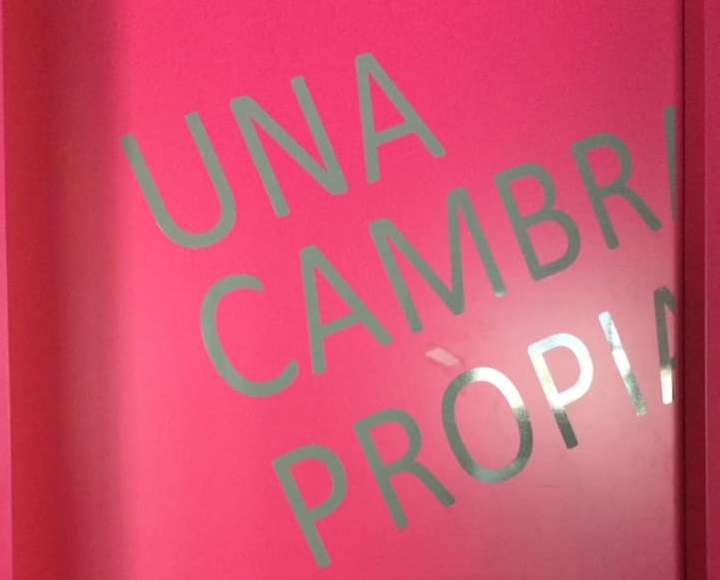
The door to my office in the Teatre Arniches with A Room Of One’s Own written in Valencian
It was the playwright Víctor Sánchez Rodríguez, whom I had worked with previously on Cuzco, who alerted me to the opportunity. We put together an application with his new play La Florida and were delighted when, a few weeks later, the news reached us that we had been selected. In October I was on my way to Spain to work for three solid weeks on his play.
Even before I arrived, I was already aware of what an excellent opportunity this was. A brooding noir of murder and mystery on the Valencian coast, La Florida is an ambitious and relatively long play which I would have been unlikely to be able to take on unpaid as a passion project and which would be hard to pitch to Anglophone producers without having the translation completed already. The very fact of being in a position to translate the play and to be paid a professional fee for it was in of itself a real boon.
Once in Alicante, however, other welcome advantages soon made themselves evident. Greeted at the bus station by Lola Sáez, the administrator at the theatre, I was a day later led into a spacious, quiet office which would be mine for the three weeks, with full access to all of the office facilities and free entry to all of the theatre’s productions. It felt very appropriate that the door to my office (“my” office!) had Virginia Woolf’s famous line, “a room of one’s own” painted on it in Valencian.
I was also greeted by the artistic director of the Arniches, Alicia Garijo, who as well as welcoming me, also put me in touch with the translation department of the University of Alicante. I had hoped while in Spain to be able to work with students and thanks to this support from the theatre I was able to arrange a two-hour workshop on theatre translation with final-year translation students working from Romanian, English, French, and German.
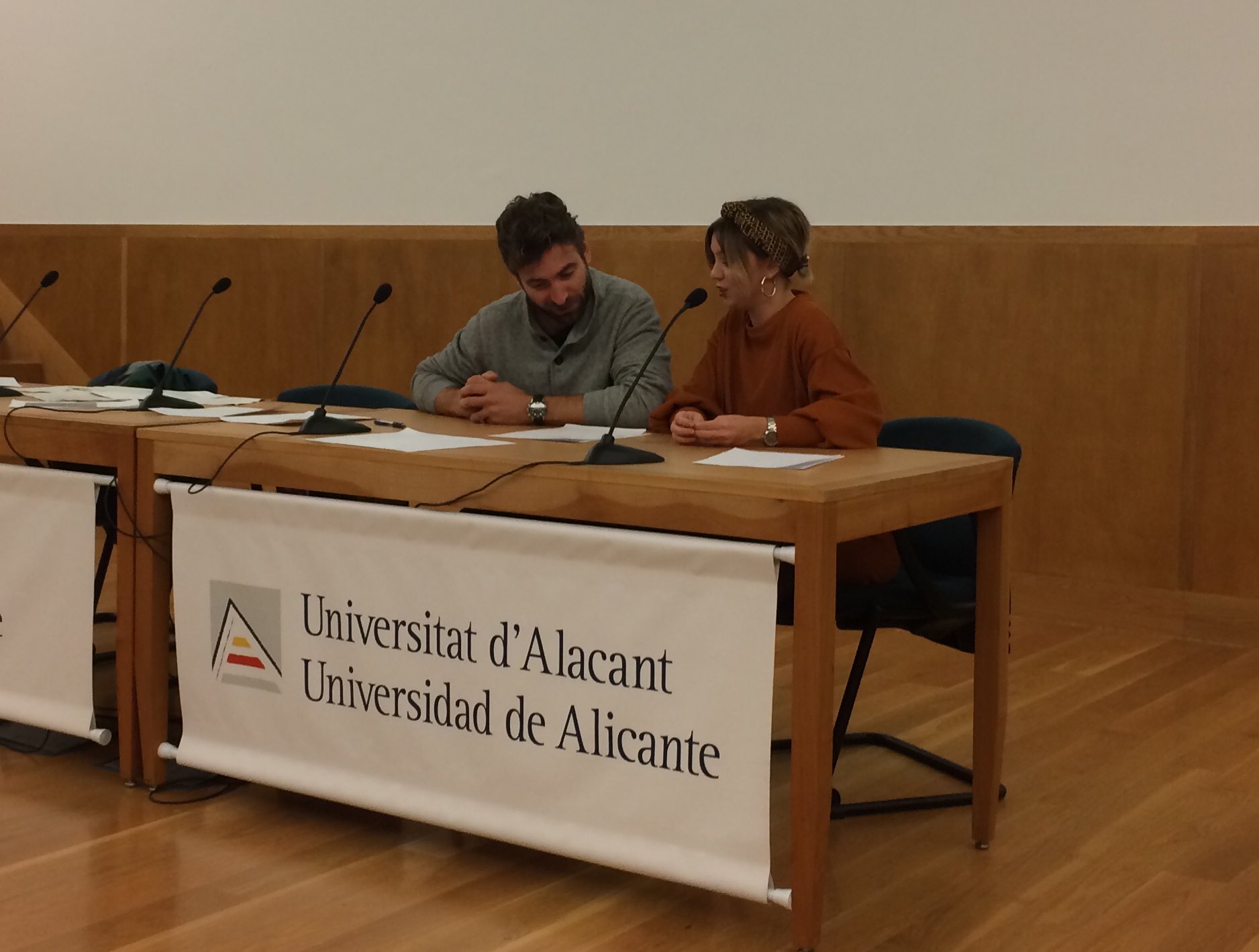
Actors Raquel González and Ricardo Molina read students’ translations at the University of Alicante
The residency was also timed to coincide with the annual Muestra de Dramaturgia Contemporánea in Alicante, a week-long festival of new plays from all over Spain, showcasing everything from cabaret and stand-up comedy to black-box productions or major commercial touring shows. During this week, translators from a host of different countries–all theatre translators from Spanish into their own tongues–descended onto Alicante. It was a treat to spend a week in the company of fellow theatre translators, sharing our experiences of translating plays in our respective countries, swapping tips on the writers we found most exciting, showing off our recent publications, and of course seeing a lot of theatre during an intense seven days.
The muestra, spearheaded by the tireless Guillermo Heras, was an excellent showcase of the great diversity in Spanish playwriting today. Highlights for me included What Happened To Michael Jackson? a gig theatre-inspired exploration of fame, obsession, and mental health in the Instagram age; Beware of the Dog by Eva Redondo, a gut-twisting, intelligent dissection of the patriarchy at its most insidious, and Fiesta, Fiesta, Fiesta, a verbatim play based on interviews with staff, students and parents from a Spanish high school whose diverse cast exploded onto the stage with a passion, urgency and artistry that was a breath of fresh air.
It was during this week that I was also given the opportunity to take part in press conferences and other promotional events linked to the muestra. Outside of translation circles chances like these are, again, rare for a translator, and being afforded a platform alongside playwrights and other creatives was a very rewarding experience. The role of the translator in Spanish theatre is, like in the UK, still a mysterious quantity, so to be afforded the chance to speak about my work and the task of translation in general to a wider audience was a welcome one.
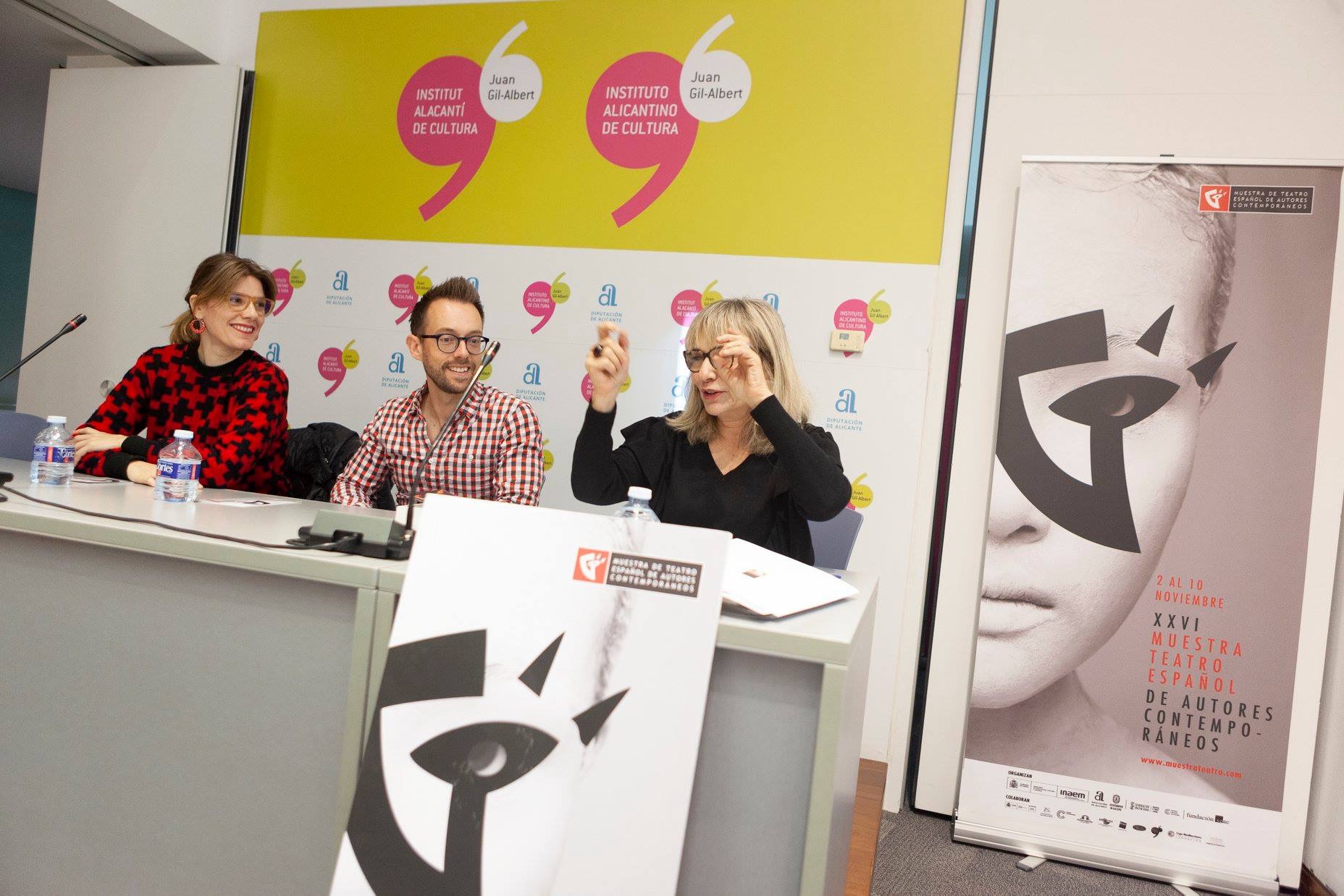
With playwright Eva Redondo (left) at the Alicante national playwriting festival
One of the most rewarding aspects of the residency was the “quality time” I was able to spend with the translator, Víctor Sánchez Rodríguez. Have the chance to chat face-to-face about the play, and to visit the locations that had inspired it, proved to be more even fruitful and transformative than I had imagined before arriving in Spain. As translators, it is rare for us to be able to experience directly the places that appear in the works we translate. It might well be argued–and I have often thought this myself–that in the Internet age this does not matter a great deal. We can research endlessly online, searching for texts, sounds, and images that give us some sense of the worlds we are recreating in another tongue. We can engage virtually with the writer with ease. And after all, it is the words that we are translating: as long as we translate what is already in the text, then all will be well, surely. But in the case of La Florida, at least, I found that my approach to the translation was deeply changed by our field trips and physical face-time.
Set in a holiday resort out of season, La Florida can on a first reading conjure up many familiar images in a UK reader. The coastline on which the play is set is the same one that is visited summer after summer by sun-seekers from northern Europe, often on all-inclusive package trips. Benidorm–mentioned in the play–is famous (or infamous, depending on your view) for its high-rise hotels filled with holidaymakers from the UK, its English pubs and full English breakfasts, and hostelries were Spanish is not even understood, much less spoken. Indeed, it inspired a highly successful TV series in the UK, a comedy named after the town which for many years poked gentle fun at Spain’s perennial package tourists.
It was tempting, then, to see La Florida through this filter: a high-rise Benidorm emptied in the winter where the characters, although Spanish, might conjure up the images of budget holidays at their finest. I could not help thinking too of the BBC soap Eldorado, which ran for just one year in the 1990s: the corporation spent a famously large sum of money building an entire village in Andalusia to film its own telenovela of European expats running away to the Spanish sunshine, but the program only lasted for one year. Nevertheless, as a teenager, I had been hooked, and when Víctor’s play presented me with Lola Vargas, a faded Spanish singer, I couldn’t help remembering Eldorado’s glamour-through-tragedy trouper, Trish Valentine.

Playwright Víctor Sánchez Rodríguez in the landscape that inspired La Florida
But how wrong I was. Visiting Canut d’en Berenguer, the location that inspired La Florida, accompanied by Víctor as my guide, I saw a very different world. This was no package holiday beach resort. There were no English pubs or English breakfasts here. Nor was this a high-rise tourist metropolis. Rather, there was space, calm, and emptiness. The apartment blocks were sober, minimalist, spaced out and with their shutters down. The beach retained a certain wildness, with boardwalks crossing the still-wild dunes and the waves crashing behind a palm-lined shore. Walking further on, the low-rise restaurants, their names emblazoned on signs placed atop high poles, reminded me of the diners and motels lining US highways. And as Víctor talked more about the inspiration for his play, I began learning more about how officials in the region had indeed pitched this part of Spain as a European California, its climate, facilities, and architecture all emulating the Golden State. It was not Northern-European holiday kitsch that had inspired La Florida; it was West-Coast hard-boiler noir. Though capable of raising a laugh, the characters were dark to their souls; though the sunshine beat down even in winter, the light barely filters through their shutters.
I returned to Alicante with much food for thought. After leaving the translation to rest a while, I revisited it with the real La Florida in my mind. The characters’ comic eccentricity yielded gently to a deeper feeling or loneliness, secrecy and danger. The settings I imagined oozed filtered light, cigarette smoke and shadow. The moments of light relief glimmered briefly amidst a much darker world than I had originally sensed. Managing to complete the translation on time, I was delighted when Víctor, having read it, told me how happy he was with it.
The opportunity of a residency for any translator also has knock-on benefits. Because the residency allowed me a trip to Spain, I took this opportunity to arrive in the country a few days before my official start date and to leave a week after it ended, taking the time for research, meetings, theatre-going and, yes, a little sight-seeing. I started out in Melilla, the Spanish city perched on the north coast of Africa and surrounded by Morocco. As well as being a fascinating place (multicultural Melilla is second only to Barcelona as a showcase of modernista architecture), it was also the inspiration for Julio Escalada’s On the Edge, a play I recently translated for the Oberon Anthology Of Contemporary Spanish Plays. Strolling around the streets of this small but proud enclave, struck by the contrast between the sparkling town-centre shopfronts and the queues of cars at the border post, I was fascinated to see the world conjured by Escalada with my own eyes.
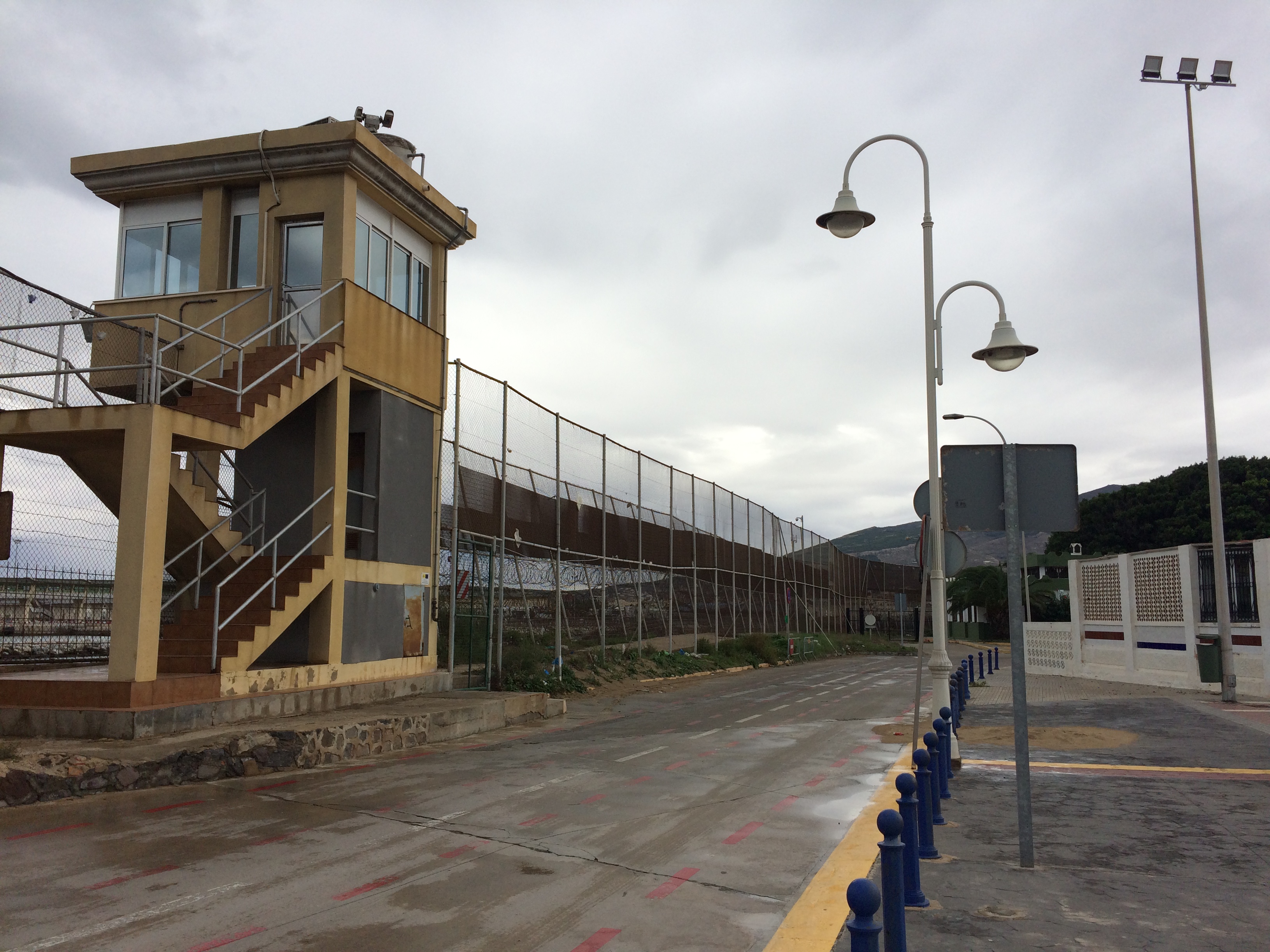
A guard post on the Melilla-Morocco border, where the EU meets Africa. The enclaves of Ceuta and Melilla inspired On the Edge
After the Residency I was able to spend time in Madrid, seeing more theatre, meeting with editors (Spanish theatre publisher Antígona has recently begun publishing contemporary Spanish plays in bilingual Spanish/English editions), playwrights and other theatre colleagues, and spending more time with Víctor Sánchez to talk about his work and our collaborations. This coincided with the Madrid run of Cuzco, a play of Víctor’s that will be opening in London in January in my English translation. I was invited by Víctor to take part in a post-show discussion after one of the performances and again to promote the figure of the translator in theatre to audiences and fellow theatre practitioners alike.
While we all benefit hugely from the opportunities for communication that technology affords us the experience of this unique residency confirmed to me the huge value of physical presence in a country, of feeling valued by the theatre company in general, and of forging and reinforcing professional and artistic relationships face to face. It is so rare for translators to be given a chance like this. There are many events that I have not attended around the world simply because I could not afford to, and I am sure many translators face the same challenges. But as I write these words during the closing hours of my time here, I reflect on what a boost of creative energy, imagination, and self-confidence it has given me to continue my work in a sometimes very difficult field, for my own benefit, yes, but also for that of other translators, and for the writers and other individuals and institutions who, through allowing me to translate their work or, in the case of the GVA/IVA, but a great amount of trust in me, which I hope I will be able to repay. The work in Spain done, the work in the English-speaking world begins: the promotion of La Florida in the hope of finding it a home on a stage, in print, or both. The residency is a great privilege, and with it comes responsibility.
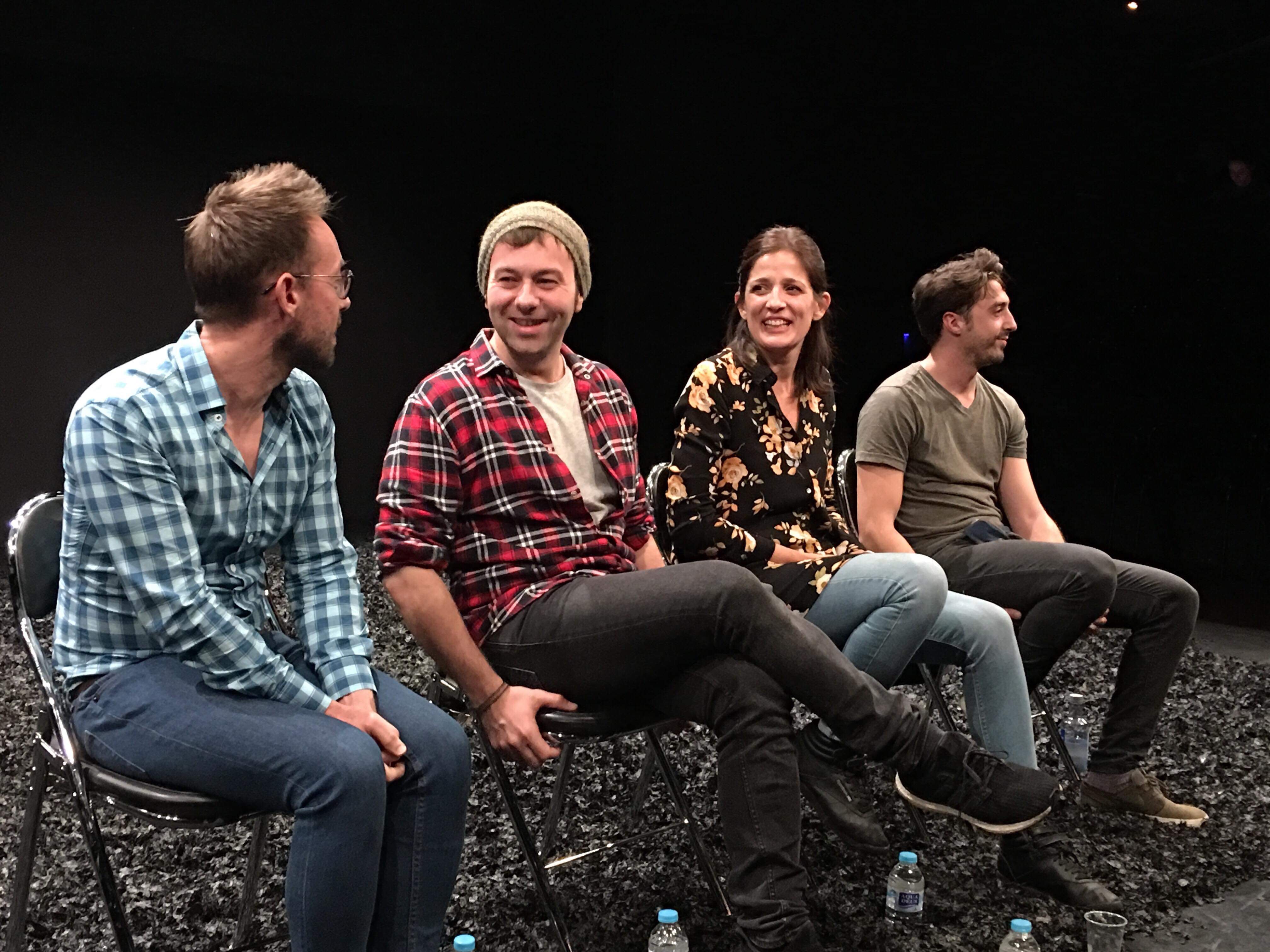
With playwright Víctor Sánchez Rodríguez and actors Silvia Valero and Bruno Tamarit at a post-show talk
If I missed anything from the residency, it was the chance to take the translation through that final road-test: a session with a group of actors, to hear the play read back to me and make adjustments accordingly. Being an ex-pat haven, Alicante does, I discovered, have a number of English-language amateur theatre groups who might, had I had the time, have been able to help me listen to the play. But as the deadline approached and the muestra intensified, the idea fell by the wayside. Back in London, I hope we might be able to arrange a reading in English in the not-too-distant future.
This did make me reflect, however, on how great it would be for a theatre in my own country of the United Kingdom to offer a similar opportunity to a translator (or translators) into English, and for such an opportunity to include working with actors. Translators in the English-speaking world rarely have the luxury of receiving feedback from a cast of actors purely in the interests of the translation rather than of the play itself, and I often think the fact that this step is skipped in the production of plays in translation can lead to the work suffering somewhat. The translation program of the international theatre company [Foreign Affairs] does dedicate exactly this sort of attention to the work of the translator, but our larger producers and spaces, some of which stage translations with some regularity, could do more to nurture the work of translators in their own right. A residency like the one I enjoyed in Alicante could be one way to do it.
I must end on a personal note. During my time in Alicante, I received the shock news of the sudden and unexpected passing of Elyse Dodgson, the indefatigable head of the Royal Court Theatre’s international department. I worked with Elyse as a translator for 15 years. I was one of the hundreds, if not thousands of people around the world directly or indirectly touched by Elyse’s passionate work promoting new writing from around the world both in the UK and globally. Her loss leaves a great gap in the international theatre firmament. It was Elyse who gave me my first professional translation contract and I would not have been at the Alicante residency at all were it not for that chance that she gave me back in 2003. I will be eternally grateful for all that she did. The translation I worked on in Alicante is dedicated to her. Gracias, Elyse.
This post was written by the author in their personal capacity.The opinions expressed in this article are the author’s own and do not reflect the view of The Theatre Times, their staff or collaborators.
This post was written by William Gregory.
The views expressed here belong to the author and do not necessarily reflect our views and opinions.

